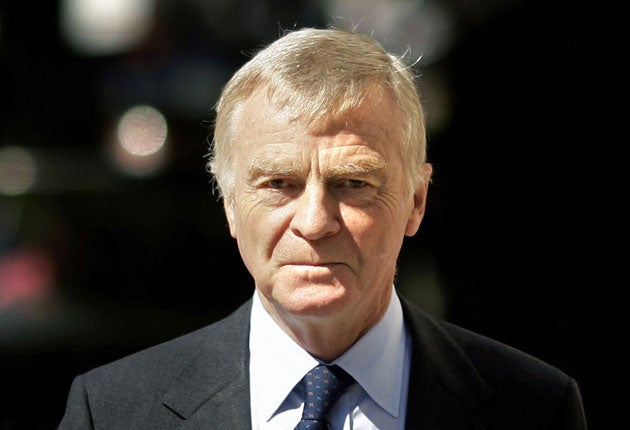Resign! The art of quitting with honour
While scandal can bring down the powerful, others feel they have to make a stand

The four Rs of a scandal: revelation, rage, responsibility and, finally, resignation. With a theatrical ritualism, in just 72 hours earlier this month, the high-flying careers of Les Hinton, Rebekah Brooks, Sir Paul Stephenson and John Yates tumbled from the branches of power. High-hanging fruit sent crashing to earth; venues as varied as Westminster corridors to stock market floors were spattered by the impact.
Were there a fifth R to this arc of opprobrium it would be this: rumour. Were they forced out? Were they victims? Before their sword-impaled bodies had even been dragged from the stage theories swirled. Resignation is, by nature, an act clouded in innuendo, encompassing at times contradictory motives: lofty moral stands and base calculation, self-sacrifice and self-preservation. Both maverick and martyr raise the same flag, while true motives and consequences often remain deeply private and unique.
If, as it is said, the art of a good resignation is timing, then it is fitting that this week a BBC documentary airs on the subject. My Resignation looks behind the headlines at some of the most famous acts of quitting in the past few decades: Home Secretary Jacqui Smith, toppled by the expenses scandal; Lord Luce, becoming a casualty of the Falklands invasion; Alastair Campbell, walking away from No 10; and the BBC's director general Greg Dyke, condemned by the Hutton inquiry.
Yet perhaps the most interesting aspect of resignation is not watching the powerful become suddenly powerless, but the inverse. The junior anaesthetist Dr Stephen Bolsin blew the whistle on infant death rates at Bristol Royal Infirmary in 1995, sparking a public inquiry and saving countless lives. While the civil servant Katharine Gun attempted to avert the Iraq war by leaking information about US diplomatic blackmail, provoking international outrage.
It is an illuminating aside that our social conventions dictate that those at the top of the ladder should take responsibility by committing career hara-kiri. Yet, for the toiling masses, being responsible is deemed to be about keeping your head down and avoiding taking stands.
Meanwhile, the nature of our existence demands that moral considerations compete with less celestial concerns. Greg Dyke said: "It was interesting that the only two people who left the BBC at that time were the only two who didn't have a mortgage." When I resigned as a reporter at the Daily Star over what I perceived to be deeply irresponsible journalism – a tale also featured in Wednesday's documentary – the question I was asked most often was: "Have you won the lottery?"
Hollywood has long recognised the romance of a principled resignation; we've all seen the steel-jawed cop slide his gun and badge across the desk before pacing into the night with just his fists and wits for protection. It's hard to explain to the uninitiated how deliciously subversive and self-affirming it feels to leap blindly from a cliff, just praying you hit water. And it's only when your feet hit the seabed that you recognise The End you feared so much was, in fact, the marker for a new beginning.
'My Resignation' is on BBC 4 on Wednesday, 9pm
Resignations...
Katharine Gun, 36
Translator, Government Communications Headquarters (GCHQ)
"I couldn't live a duplicitous existence and I told my line manager. I was very innocent. Maybe I should have made a really loud announcement."
Greg Dyke, 64
BBC director general, 2000-2004
"I didn't sleep much, and I guess I decided then to go. If you've lost the support of the board you can't really stay – too much aggro."
Jonathan Grimshaw, 56
One of first men in the UK diagnosed with HIV, and founder of the Body Positive charity
"I was so angry, so fired up and determined to achieve everything I wanted to in as long as I had that I absolutely threw myself into committed campaigning."
Lord Luce, 75
As Richard Luce MP, was Minister of State for Foreign Affairs, 1981-1982
"Margaret Thatcher said, 'I hear you're thinking about resigning – I order you not to.' I said that for me it was a matter of honour. There was a silence and she said, 'I can't quarrel with honour.'"
Max Mosley, 71
Head of the FIA, 1993-2009
"If I had resigned it would have been a cowardly resignation because I'd done nothing wrong."
Alastair Campbell, 54
Downing Street Director of Communications & Strategy, 1997-2003
"I was reaching a point where I decided that if I push this much further, I'm going to end up without a family."
Caroline Meagher
Military policewoman, 1981-1993
"I felt cheated out of my resignation. I wasn't allowed to leave with some shred of dignity and some pride in my career."
Jacqui Smith, 48
Home Secretary, 2007-09
"Gordon Brown said, 'If you resign over this you'll always be remembered for resigning over expenses.' I said, 'But I can't do the job you asked me to do.'"
Dr Stephen Bolsin, 59
Anaesthetist, Bristol Royal Infirmary, 1989-1995
"You see a pile of dead children's bodies in your mind because these people wouldn't stop operating on them. One of us had to resign, and they weren't going to."
Lord Lambton
1922-2006, Defence minister, 1970-73. From an interview in May 1973
Interviewer Robin Day: "Why should a man of your social position have to go to whores?"
Lord Lambton: "People like variety. I think it's as simple as that."
Subscribe to Independent Premium to bookmark this article
Want to bookmark your favourite articles and stories to read or reference later? Start your Independent Premium subscription today.

Join our commenting forum
Join thought-provoking conversations, follow other Independent readers and see their replies